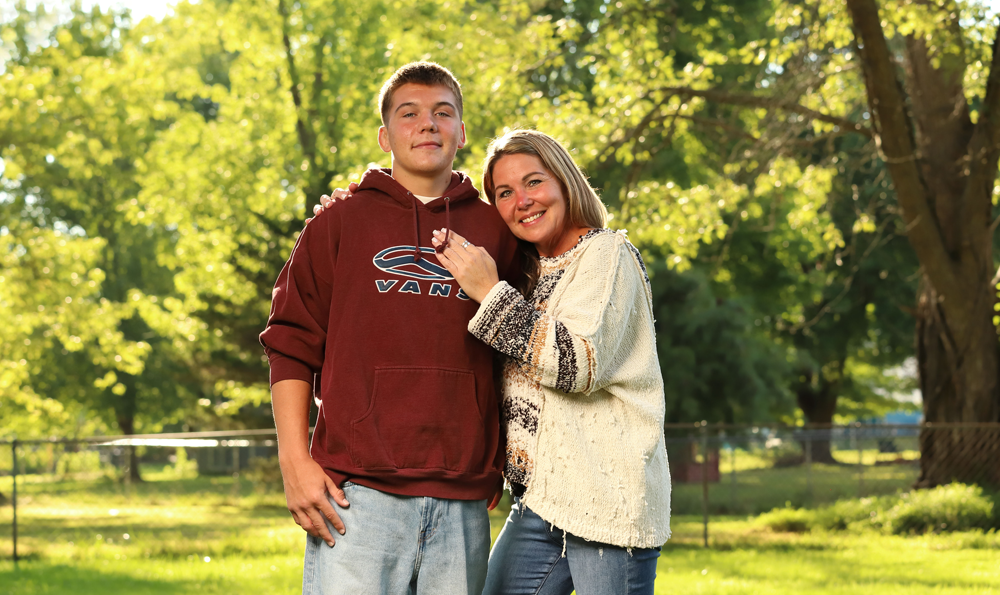J.J. was a high school senior and captain of the wrestling team when he collapsed on a treadmill during a workout at a friend’s house. At just 18 years old, J.J. was in full-on cardiac arrest. Thankfully, his friends were trained in CPR and immediately started chest compressions.
He was rushed to Atlantic Health System’s CentraState Medical Center for lifesaving care, and the emergency physicians knew exactly what J.J. needed. That’s because he had a heart condition that was fully detailed in his Atlantic Health electronic medical record, which was shared with his medical team. Without this insight, J.J.’s story could have had a very different ending.
A young athlete with heart troubles
When J.J. was 14 years old, he was diagnosed with a genetic heart condition called hypertrophic cardiomyopathy (HCM). The disease causes the heart walls to thicken, making it difficult for the heart muscle to pump blood. His mom, Laura, researched and found specialized care from Matthew Martinez, MD, director of sports cardiology at Morristown Medical Center and a nationally recognized expert in HCM.
“J.J. was a kid who was always on the move,” says Laura. “He was passionate about wrestling from the start, and now we had so many questions. Could he continue the sport? Should he lift weights? What is considered too strenuous? Would he be able to run, train, and physically push himself?”
Dr. Martinez evaluated J.J. and assessed his physical condition. Although there was slight thickening of his heart muscle, there were no signs of scarring. So, Dr. Martinez developed a treatment plan that allowed J.J. to continue wrestling with very few limitations on his activities.
An aggressive treatment plan
On the day J.J. was transferred from CentraState to Morristown Medical Center, he was put into a medically induced coma. Doctors cooled his body temperature to 88 degrees to protect his brain. A machine circulated his blood to give his heart a chance to heal.
“We needed to preserve J.J.’s brain function and provide heart and lung support using extracorporeal membrane oxygenation (ECMO),” says Amirali Masoumi, MD, medical and interventional director of the Cardiogenic Shock Program at Atlantic Health System.
For two days, J.J. remained unconscious while honest conversations took place between his family and the critical care team. Then came the first signs of life.
On Mother’s Day, 2024, J.J. squeezed his mother’s hand for the very first time. Laura squeezed back, and J.J. squeezed again. Then he began to move his eyeballs beneath his eyelids. “Seeing J.J. start to recover was the best gift imaginable,” says Laura.
All signs point toward recovery
As J.J.’s heart and organs started to respond, the critical care team eased back life support. By the end of the week, J.J. was fully awake with his heart and brain function intact.
“So many people made his recovery possible,” says Laura. “J.J’s fight for life and his amazing comeback victory was truly the greatest I’ve ever seen.”
Just days after celebrating his 19th birthday, J.J. was discharged from the hospital. A defibrillator was implanted in his chest to deliver electric shock if his normal heartbeat should become irregular.
Teamwork supports every stage of care
J.J. was crowned prom king and graduated from Howell High School just six weeks after his heart had stopped beating.
“Cases like this stay with you because it took so many people at each stage to save J.J.’s life,” says Dr. Masoumi. “It’s what J.J.’s friends did when he collapsed. It’s what the EMTs did when his heart stopped beating on the way to the hospital. It’s what CentraState’s doctors did when they stabilized him. And it’s what our cardiogenic shock team here at Morristown did to get J.J. back on his feet.”












